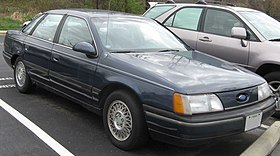First-generation Ford Taurus
| Ford Taurus (first generation) | |
|---|---|
 |
|
| Overview | |
| Manufacturer | Ford |
| Production | October 1985–July 1991 |
| Assembly |
Hapeville, Georgia, United States Chicago, Illinois, United States |
| Designer | Jack Telnack (1982) |
| Body and chassis | |
| Class | Midsize car |
| Body style | 4-door sedan 5-door station wagon |
| Layout | FF Layout |
| Platform | Ford D186 platform |
| Related |
Mercury Sable Ford Taurus SHO Lincoln Continental |
| Powertrain | |
| Engine | 2.5 L HSC I4 3.0 L Vulcan V6 3.8 L Essex V6 |
| Transmission | 3-speed ATX automatic 4-speed AXOD automatic 4-speed AXOD-E automatic 5-speed MTX manual |
| Dimensions | |
| Wheelbase | 106.0 in (2,692 mm) |
| Length | 188.4 in (4,785 mm) Station wagon: 191.9 in (4,874 mm) |
| Width | 70.8 in (1,798 mm) |
| Height | Sedan: 54.3 in (1,379 mm) Wagon: 55.1 in (1,400 mm) |
| Curb weight | 3,050 lb (1,380 kg) |
| Chronology | |
| Predecessor | Ford LTD |
| Successor | Ford Taurus (second generation) |
The first-generation Ford Taurus and Mercury Sable are automobiles that were produced by Ford as the first of six generations of the Ford Taurus and Mercury Sable Introduced in December 1985 as a 1986 model, the front-wheel drive Taurus was a very influential design that is credited with saving Ford from bankruptcy, bringing many innovations to the marketplace and starting the trend towards aerodynamic design for the American automakers in the North American market.Ford of Europe had launched the 1980s move to aerodynamic design for the company with the 1982 Ford Sierra.
Development for the first-generation Taurus started in the early 1980s to replace the Ford LTD, at the cost of billions of dollars, with a team led by vice president in charge of car development Lewis Veraldi dubbed "Team Taurus." Ford was suffering from a lackluster product line from the late 1970s to the early 1980s and then-chairman Philip Caldwell staked much of the finances and future of the company on Veraldi and his team's success, giving them unprecedented leeway in developing what would become the Taurus. The Taurus' development employed a strategy of teamwork and customer communication that would prove very influential for the automotive industry, as it consolidated all of Ford's designers, engineers, and marketing staff into a group who worked on the car collectively. The Taurus' development was initially kept very secret by Ford, and not much was revealed about the final Taurus until it was unveiled in 1985.
After its release, the Taurus became a strong seller, as over 200,000 would be sold in the 1986 model year, and over a million were sold by 1989. This generation of Taurus garnered additional sales by its two variants: a Mercury version entitled the Sable, and a high-performance version entitled the SHO, and its engine and drivetrain would be used on the 1988 Lincoln Continental. This generation of Taurus continued with only minor changes until it was replaced in 1992 by the second-generation Ford Taurus. When production ended in 1991, more than 2,000,000 First-generation Tauruses had been sold.
...
Wikipedia
